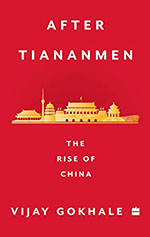China’s unprecedented rise has forced the world to restudy and refocus on the major factors behind this development. The Deng Xiaoping era is considered to be the time when China moved out of the trap of a low-income agrarian society to becoming the factory of the world and the second largest economy. The reform and opening up announced by Deng in late 1978 gave China the direction which it needed to gain momentum.
After 1978 the other watershed incident in the history of the Chinese Communist Party (CCP) was the Tiananmen Square Incident of 1989, something which the Party wants to forget and erase from its narrative. It was Deng who played a major role in suppressing these protests and also staying committed to further reform and opening up despite major resistance from Party leaders. The protests of 1989 completely transformed the foreign and domestic policies of the CCP. The author argues, ‘The protests of 1987 and 1989 had shown that the Chinese people had new socio-economic expectations. The Party began the difficult task of making the requisite adjustments to align itself to public expectations’ (p. 22).

